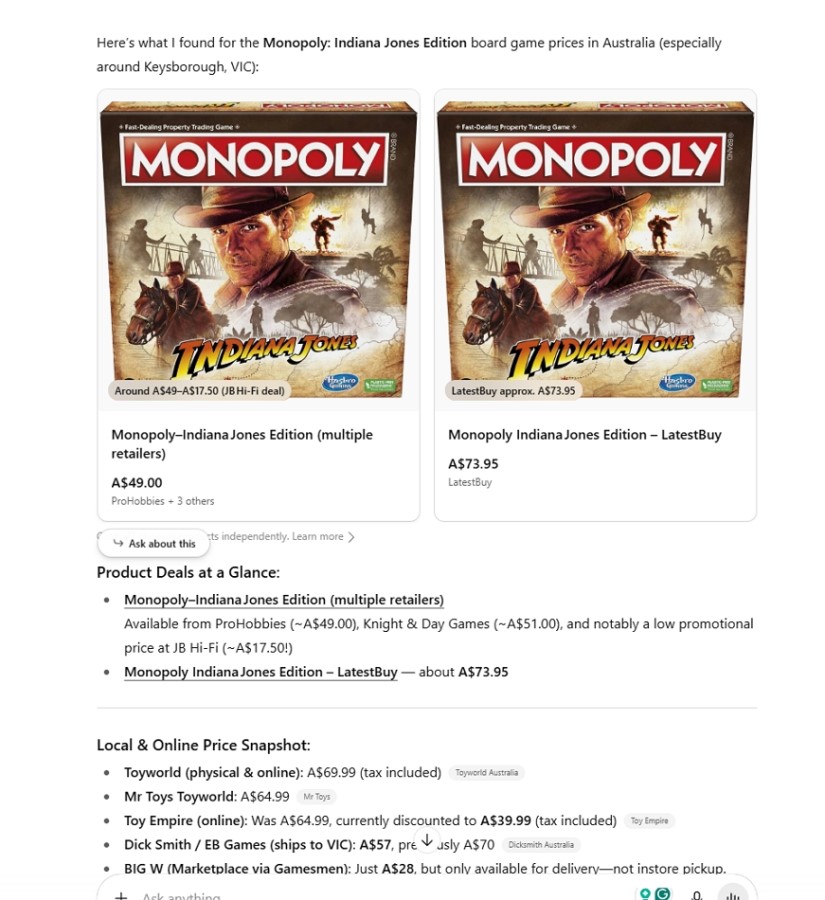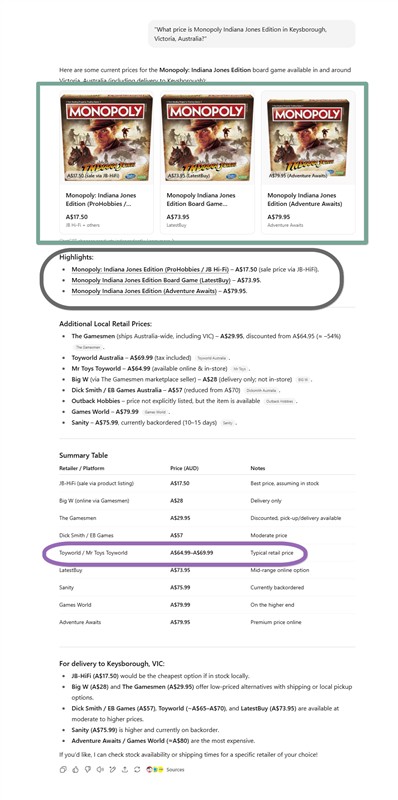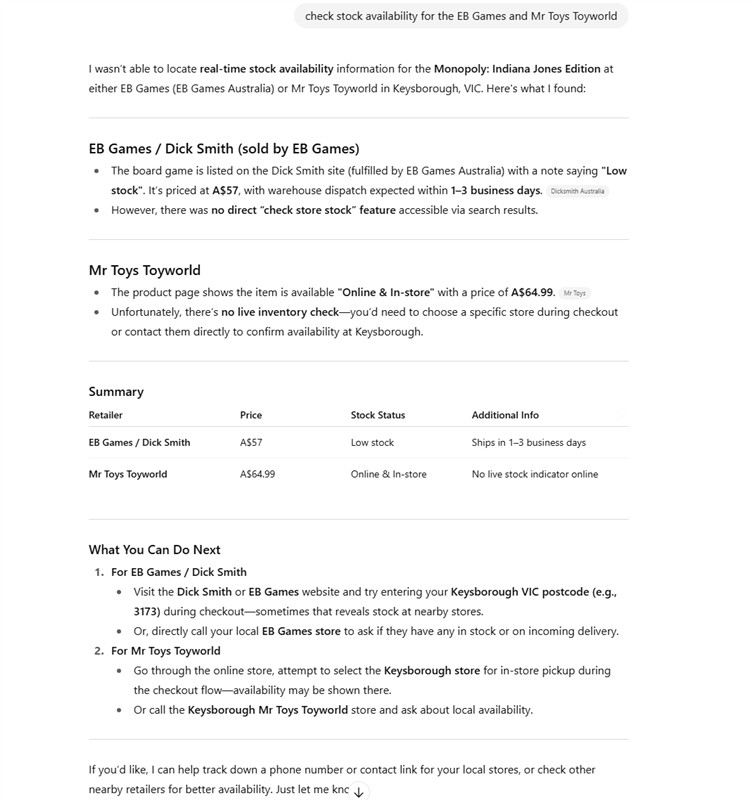Boost Profits Use Free AI Pricing Tools Now

Yesterday, I discussed the report that you can quickly get for doing price checks on products in your area. Now I will review the options for getting the report. As I discussed yesterday here, suppliers present you with many products, but it's hard to know the real retail price and your item's margin, so Australian retailers are using free AI tools that automate price checks. These tools help you quickly compare prices, avoid idle stock, and maximise margins without manual searches, saving time and boosting profits. The problem is that manually checking prices via search engines is time-consuming.
In comparison, a simple Google Shopping search works for a single product. If, for example, I want to check 40 products and it takes me a minute or so to do one, I am looking at an hour of work. This is why, when you have many items to check, that's where AI can help, as it offers a quicker way to get real-time insights. Not only that, but it provides a deep analysis and local relevance. This allows you to get real figures so you can improve customer satisfaction and boost your bottom line.
In our test, we focused on free AI systems to keep things accessible for small operators. We limited evaluations to no-cost options, ensuring recommendations fit tight budgets. By the end, you'll have clear guidance on which AI tool might suit your needs.
Our Evaluation Approach
Using the scoring system below, we tested six free AI tools with a query.
"What price is Monopoly Indiana Jones Edition in Keysborough, Victoria, Australia?"
As usual, we used a Structured Scoring System.
To fairly assess these AI tools, we adopted a 100-point scoring system based on key criteria essential for retailers.
The categories include:
- Accuracy (30 points): How closely the AI's price data matches verified market values. Google Shopping was used as a benchmark here.
- Relevance and Personalisation (20 points): Most of our clients are local, so we gave points to their location and business context.
- Completeness and Depth (20 points): Coverage of options, variations, and caveats.
- Helpfulness and User-Friendliness (15 points): Actionable advice and ease of use.
- Clarity and Structure (10 points): Organisation and readability. Who has the time to work out things? If it can be read and absorbed quickly, the better.
- Ethical Handling (5 points): Did it state any limitations in its analysis?
This system ensures objectivity, much like how a POS analyses sales data to recommend stock levels. We evaluated six popular AIs: Deepseek, Qwen, Claude, Grok, Gemini Google, and ChatGPT. Let's dive into the results, highlighting how each could enhance your shop.
Here's how each performed, starting with the lowest scorers.
Claude
Summary: Lacking Specifics
We failed it as it did not give prices. We are testing for prices, and it provided none.
We liked that it openly admitted it can't fetch real-time prices and provided some helpful information. However, if you are looking at price checking, forget it.
Deepseek
Summary: Solid Local Focus with Room for Precision
Deepseek performed respectably, scoring 75 out of 100. It provided price ranges of $40–$60 for standard editions and $70–$100 for collectors, which are somewhat realistic but slightly overestimate everyday values. What surprised us was that it excelled in local relevance by suggesting stores like Parkmore Shopping Centre in Keysborough, complete with contact tips.
The tool's structure, with bullet points and headings, makes it user-friendly. We liked that it urged you to check current prices. Overall, Deepseek offers a good starting point for SMB retailers seeking local insights without complexity.
Grok
Summary: Comprehensive with Accurate Ranges
Grok earned 80 points, delivering prices from $28–$108 across retailers, with both notes on shipping and local checks. It was personalised to Keysborough by mentioning Parkmore, though it leaned more national in focus.
While its structure had minor issues, Grok's actionable advice, such as visiting stores, makes it practical. It included helpful links without overpromising.
Qwen
Summary: Good Online Depth
With a score of 84, Qwen stands out for its balanced approach. It quoted realistic online prices of $35–$60, and we liked that it stated the local unavailability in the local shopping centre, Keysborough. A detail critical to retailers in pricing.
Qwen's clear lists and engaging tone add to its appeal.
Gemini Google
Summary: A Top Performer
Because it has access to Google shopping information, it impressed us with its retail prices, ranging from $17.50 to $80. It was heavily tailored to Keysborough locations like Parkmore. Its local focus and structure, which included tables, make it highly user-friendly.
ChatGPT
Summary: Depth and Helpfulness in Equal Measure
ChatGPT scored 90; it ticked most of the boxes: an image to confirm that you have the right product, detailed tables with prices $17.50–$73.95, strong local tie-ins, and noted caveats. Its completeness, including delivery tips, makes it a standout for comprehensive analysis.
Based on these scores, here's what stood out overall.
Overall Insights and Recommendations
Although all AI tools handled ethics well by admitting limitations, we liked that Deepseek and Gemini, in particular, urged real-time verification. Never assume that AI is correct.
Gemini (Google) and ChatGPT are good choices; they both excel in depth and relevance.
Practical Tips for Implementing AI in Your POS
1) Embracing AI for price checking positions your store for success.
2) To get started, I suggest that you choose Google Gemini or ChatGPT.
3) Test some products from your shop. I suggest starting with your top sellers and then some dead stock.
4) Get a feel of the reports.
5) Make a trip to the local shops to check the accuracy.
Start today!
Written by:

Bernard Zimmermann is the founding director of POS Solutions, a leading point-of-sale system company with 45 years of industry experience, now retired and seeking new opportunities. He consults with various organisations, from small businesses to large retailers and government institutions. Bernard is passionate about helping companies optimise their operations through innovative POS technology and enabling seamless customer experiences through effective software solutions.




